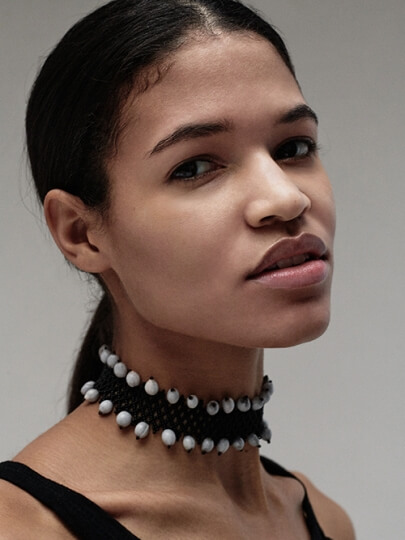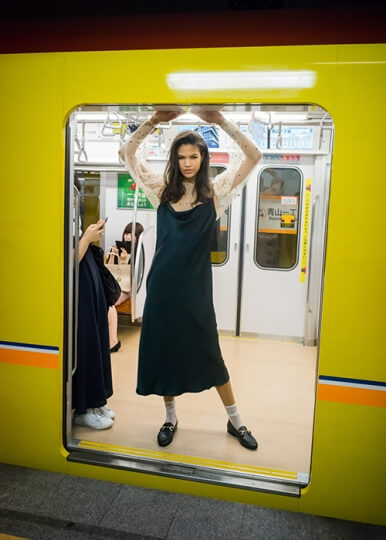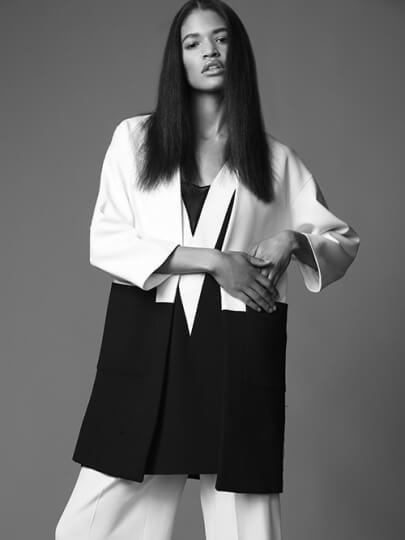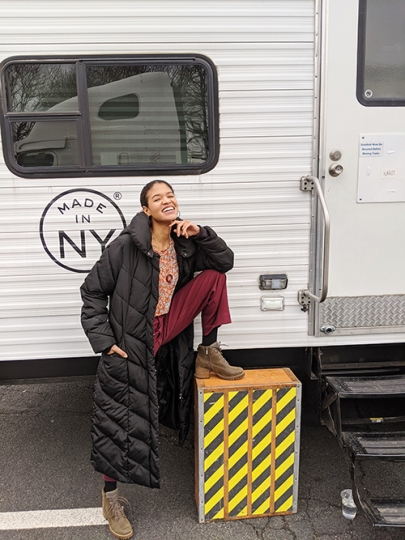For a film studio, having masked actors stand six feet apart and wash their hands frequently may work on screen for a sequel to “Contagion,” but it isn’t feasible for most productions.
With the world still in the grips of the COVID-19 pandemic, how can film and television studios keep the cast and crew safe on the set?
BACKED, a startup co-founded by actor/model/engineer Meisha Brooks, S.B. ’14,
builds enterprise technology that helps companies make fast and informed decisions about how to operate in the midst of COVID-19 and beyond, balancing economic and medical realities in an ever-changing environment. Individuals will also be able to benefit from this approach with the app NORM.
“We provide risk mitigation technology for a constantly changing world. The COVID-19 pandemic is unlike anything we’ve ever seen before, in terms of uncertainty, and that means that traditional approaches don't work,” said Brooks, who was a mechanical engineering concentrator at the Harvard John A. Paulson School of Engineering and Applied Sciences. “When you talk about disease prevention, a lot of what has been happening is an educated guessing game. We are able to provide projections to a company based on a large cross section of real-time data combined with the most up-to-date academic literature in the world.”
After months of research, the BACKED team discovered that the main problems decision makers face are lack of reliable authoritative data sources, difficulty keeping up with the scientific literature and constantly-changing regulations across multiple locations, lack of access to qualified epidemiologists, and confusing information from the media.
The startup investigates the severity of impact that COVID-19 could have on any individual and then cross references that with the likelihood of infection given the real-time circumstances at a given location, creating a dynamic and data-driven decision-making process. The academic literature informing the startup’s machine learning algorithms is sourced and reviewed by a panel of epidemiologists with various specialties, including treating COVID-19 patients first-hand in the ICU.
The resulting risk analysis helps a company evaluate the possible health outcomes and financial impacts of different decisions related to staffing and workplace procedures. The models are constantly updated as new information arises or policies shift.
For Brooks, being COO of a health and data science startup isn’t the additional career she imagined. But looking back on the winding path she followed to the role of startup co-founder, it all makes sense to her.
“With BACKED, I am able to actually use every single one of my skills,” she said. “These very different experiences in my background always perplexed me, but I’ve been able to pull from all of that. It has taught me that everything you do has a very productive purpose to it.”
Brooks during her time living in Tokyo. (Photo provided by Meisha Brooks)
Even as a young child, she felt drawn toward science because of its ability to explain how the world worked. But it was a middle school Japanese class that helped shape her interest in mechanical engineering.
She fell in love with the way Japanese sounded, and studied the language outside of school at the Japan Society of Boston. The society didn’t have a program for children at the time, so the 12-year-old took night classes alongside business executives. Her language skills sparked an interest in Japanese culture and she studied abroad in high school.
“That was such a life-changing moment for me. Seeing that we come from so many different cultures and we seem so different, but we’re all the same. Human beings are all the same,” she said. “That also contributed to a lot of my work and the directions I took in engineering.”
In Japan, she learned about the work of Osaka University researchers on humanoid robots, and became fascinated by the ever-evolving field of robotics. That passion solidified her decision to concentrate in mechanical engineering at Harvard.
During a summer internship in the Hiroshi Ishiguro Geminoid lab at Osaka University, Brooks used facial recognition and motion capture technologies to help develop an interface that would enable the lab’s humanoid robots to respond to touch-based interactions.
While she enjoyed the research, she wanted to work on projects that could make a faster impact in the world. Brooks switched gears and began studying human interfaces, including smart apparel and prosthetics.
“Something I really love about engineering is figuring out what motivates people. How do people become the people they are? A huge amount of that comes from the technology they interact with on a day-to-day basis,” she said.
Brooks had begun modeling while she was living in Boston and continued to model in San Francisco and New York City. (Photo provided by Meisha Brooks)
After graduation, Brooks continued studying human interfaces during an extra semester at MIT before heading to San Francisco to work as a mechanical engineer for a startup. She and her colleagues created smart device accessories for individuals with mobility limitations.
She had begun modeling while living in Boston, and continued to take on modeling side jobs after moving to the West Coast. Modeling provided a great outlet for her creativity because it enabled her to transform into different characters, she said.
Ultimately, Brooks didn’t feel that the West Coast was the best fit for her, so she moved to New York City to work for a smart apparel startup. But the firm soon hit financial difficulties and Brooks lost her job.
She continued modeling in New York while contemplating her next move. Brooks was about to accept a job in Tokyo, but everything changed when her modeling contacts introduced her to acting agents.
“This whole time, I had never considered acting as part of a career. I said OK, let’s do this, throw me in. They put me into all of these major auditions, so I decided to get some training. As soon as I started acting training, it was like a lightbulb went off in my head that said this is what you should do for the rest of your life,” she said. “Acting is incredibly intellectually fulfilling for me.”
After she committed to an acting career, things started to fall into place. She began having productive meetings with studio executives which led to acting opportunities. She felt mounting excitement about her future on screen.
Then the COVID-19 pandemic hit, upending Brooks’ plans and crushing the film and television production industry. She had no idea where to turn next.
The answer came from an unexpected place. A colleague from her time in San Francisco, John Cho, reached out and told her about his idea for BACKED. The concept appealed to her, and she dove in as co-founder and COO.
Brooks’ experience working in the television and film production industry brought unique insights to the firm, and her experience as an engineer added scientific rigor to the algorithms the team develops.
Brooks stands in front of her trailer on the set of the TV series "Billions." She played the character "Narit." (Photo provided by Meisha Brooks)
The biggest challenges she and her colleagues face is navigating a rapidly moving market and helping potential customers understand the importance of relying on the best science to make decisions.
“The decision making platform we’ve created, the reservoir of data we’ve created, can be applied to any industry,” she said. “We’ve started by focusing on the industries that have been hardest hit by the pandemic, where completely remote work is not possible.”
In addition to the entertainment industry, they also provide insights for commercial real estate firms, manufacturing facilities, and the travel and tourism industry.
Looking to the future, the risk mitigation tools they’ve created could be tailored to other risks, helping companies make better health decisions for their employees in a post-COVID world.
“I know with confidence that our work is saving lives. We are helping individuals and companies balance the economic and medical realities that we are now facing,” she said. “The world has changed, and people will need to understand the nuance and complexities that the situation demands when it comes to navigating the future. We have found a way that resonates with businesses and individuals. That is something that I’m incredibly proud of. No matter what, we’ve created something that has a positive impact.”
Press Contact
Adam Zewe | 617-496-5878 | azewe@seas.harvard.edu



